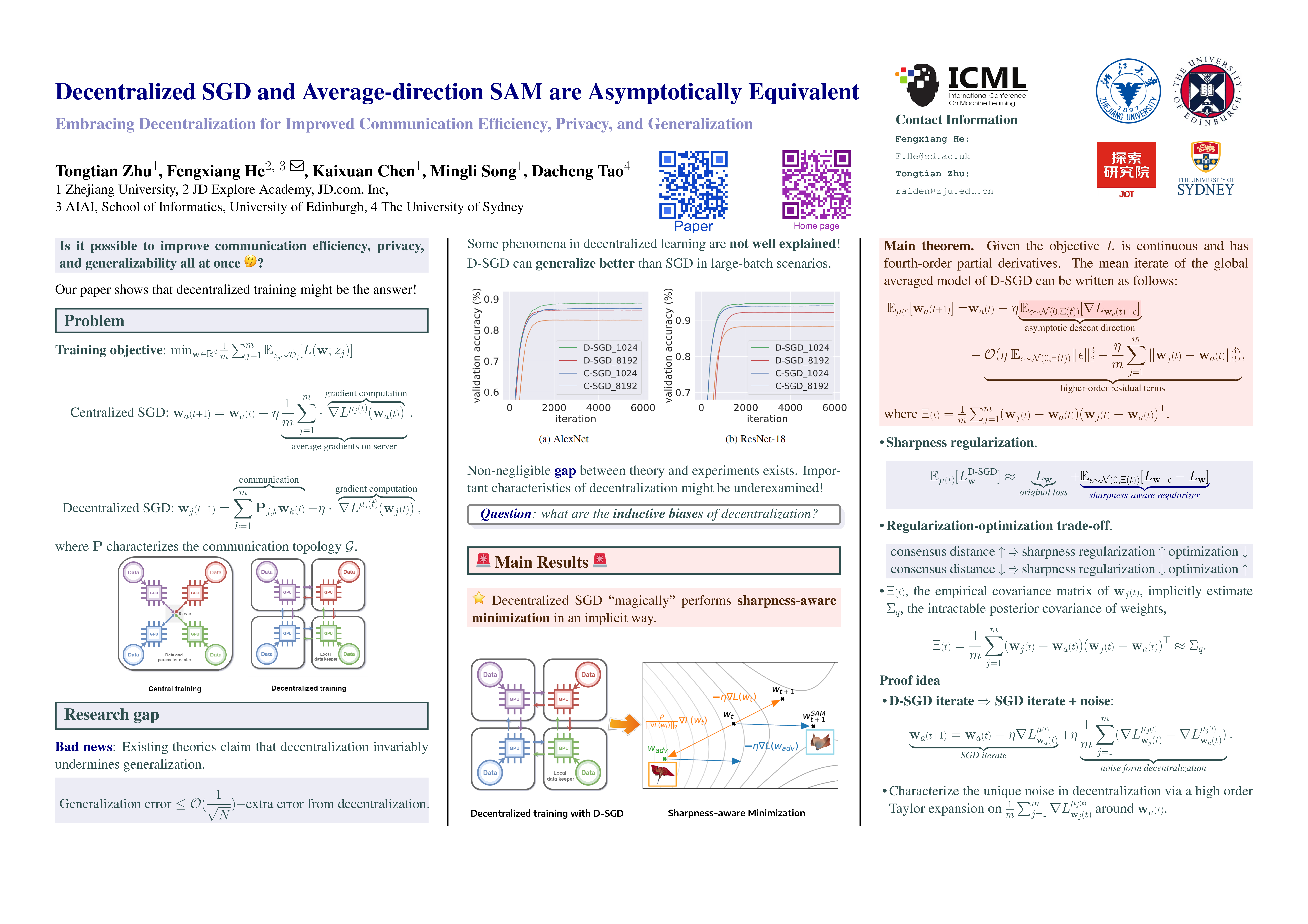The Best of All Worlds: Embracing Decentralization for Improved Communication Efficiency, Privacy, and Generalization
The repository contains the offical implementation of the paper
[ICML 2023] Decentralized SGD and Average-direction SAM are Asymptotically Equivalent
Motivating question: The Best of All Worlds? Can we guarantee communication effiency, privacy and generalizablity all at once? Our recent ICML 2023 paper proves that decentralized training might be the anwer!
TLDR: The first work on the surprising sharpness-aware minimization nature of decentralized learning. We provide a completely new perspective to understand decentralization, which helps to bridge the gap between theory and practice in decentralized learning.
Abstract: Decentralized stochastic gradient descent (D-SGD) allows collaborative learning on massive devices simultaneously without the control of a central server. However, existing theories claim that decentralization invariably undermines generalization. In this paper, we challenge the conventional belief and present a completely new perspective for understanding decentralized learning. We prove that D-SGD implicitly minimizes the loss function of an average-direction Sharpness-aware minimization (SAM) algorithm under general non-convex non-$\beta$-smooth settings. This surprising asymptotic equivalence reveals an intrinsic regularization-optimization trade-off and three advantages of decentralization: (1) there exists a free uncertainty evaluation mechanism in D-SGD to improve posterior estimation; (2) D-SGD exhibits a gradient smoothing effect; and (3) the sharpness regularization effect of D-SGD does not decrease as total batch size increases, which justifies the potential generalization benefit of D-SGD over centralized SGD (C-SGD) in large-batch scenarios.
Requisite packages can be installed directly from the requirements.txt.
pip install -r requirements.txt
python main.py --dataset_name "CIFAR10" --image_size 56 --batch_size 64 --mode "csgd" --size 16 --lr 0.1 --model "ResNet18_M" --warmup_step 60 --milestones 2400 4800 --early_stop 6000 --epoch 6000 --seed 666 --pretrained 1 --device 0
python main.py --dataset_name "CIFAR10" --image_size 56 --batch_size 64 --mode "ring" --size 16 --lr 0.1 --model "ResNet18_M" --warmup_step 60 --milestones 2400 4800 --early_stop 6000 --epoch 6000 --seed 666 --pretrained 1 --device 0
python main.py --dataset_name "CIFAR10" --image_size 56 --batch_size 512 --mode "csgd" --size 16 --lr 0.8 --model "ResNet18_M" --warmup_step 60 --milestones 2400 4800 --early_stop 6000 --epoch 6000 --seed 666 --pretrained 1 --device 0
python main.py --dataset_name "CIFAR10" --image_size 56 --batch_size 512 --mode "ring" --size 16 --lr 0.8 --model "ResNet18_M" --warmup_step 60 --milestones 2400 4800 --early_stop 6000 --epoch 6000 --seed 666 --pretrained 1 --device 0
More detailed scripts can be found in the "scripts" folder.
The 3D local loss landscape visualization is based on .
Please cite our paper if you find this repo useful in your work:
@InProceedings{pmlr-v202-zhu23e,
title = {Decentralized {SGD} and Average-direction {SAM} are Asymptotically Equivalent},
author = {Zhu, Tongtian and He, Fengxiang and Chen, Kaixuan and Song, Mingli and Tao, Dacheng},
booktitle = {Proceedings of the 40th International Conference on Machine Learning},
pages = {43005--43036},
year = {2023},
editor = {Krause, Andreas and Brunskill, Emma and Cho, Kyunghyun and Engelhardt, Barbara and Sabato, Sivan and Scarlett, Jonathan},
volume = {202},
series = {Proceedings of Machine Learning Research},
month = {23--29 Jul},
publisher = {PMLR},
pdf = {https://proceedings.mlr.press/v202/zhu23e/zhu23e.pdf},
url = {https://proceedings.mlr.press/v202/zhu23e.html},
abstract = {Decentralized stochastic gradient descent (D-SGD) allows collaborative learning on massive devices simultaneously without the control of a central server. However, existing theories claim that decentralization invariably undermines generalization. In this paper, we challenge the conventional belief and present a completely new perspective for understanding decentralized learning. We prove that D-SGD implicitly minimizes the loss function of an average-direction Sharpness-aware minimization (SAM) algorithm under general non-convex non-$\beta$-smooth settings. This surprising asymptotic equivalence reveals an intrinsic regularization-optimization trade-off and three advantages of decentralization: (1) there exists a free uncertainty evaluation mechanism in D-SGD to improve posterior estimation; (2) D-SGD exhibits a gradient smoothing effect; and (3) the sharpness regularization effect of D-SGD does not decrease as total batch size increases, which justifies the potential generalization benefit of D-SGD over centralized SGD (C-SGD) in large-batch scenarios.}
}
Please feel free to contact via email ([email protected]) or Wechat (RaidenT_T) if you have any questions.


%20on%20CIFAR-10.png)
.png)